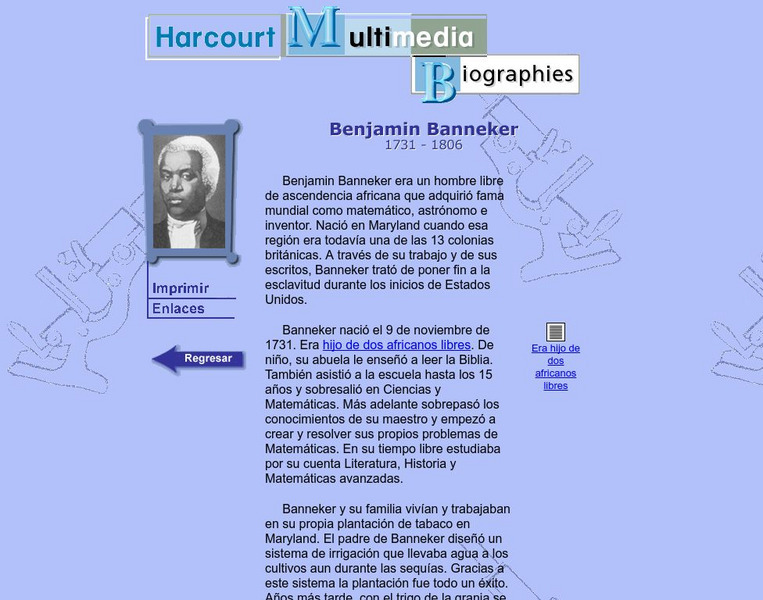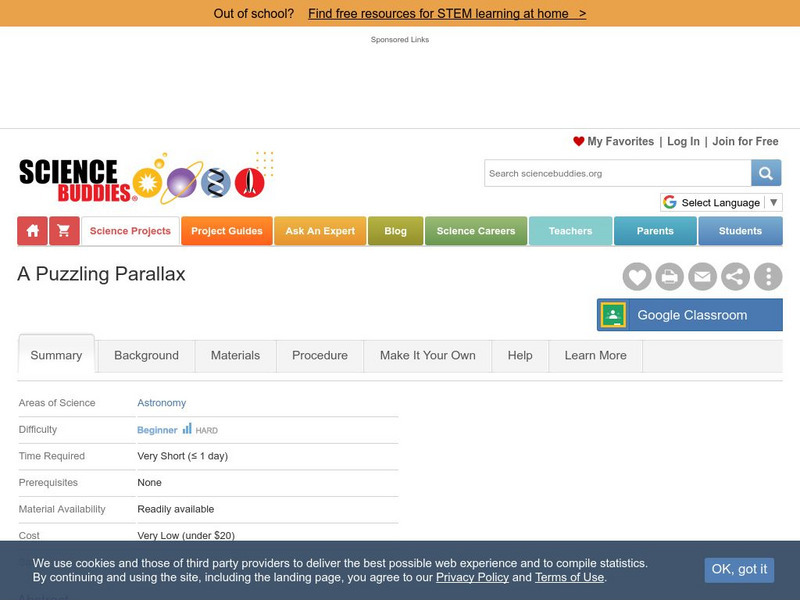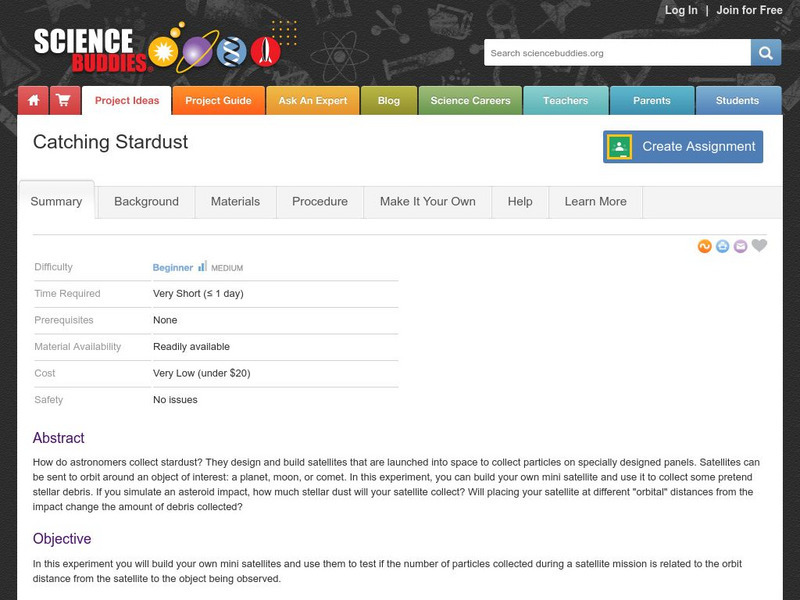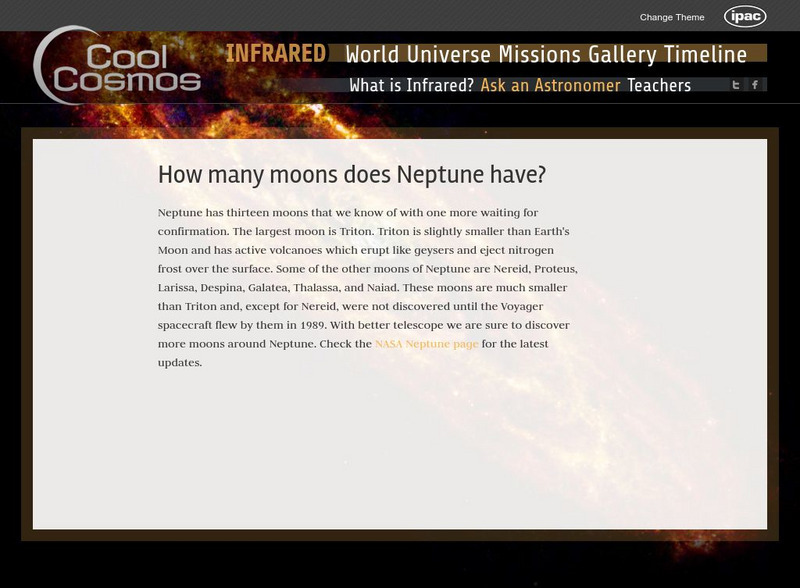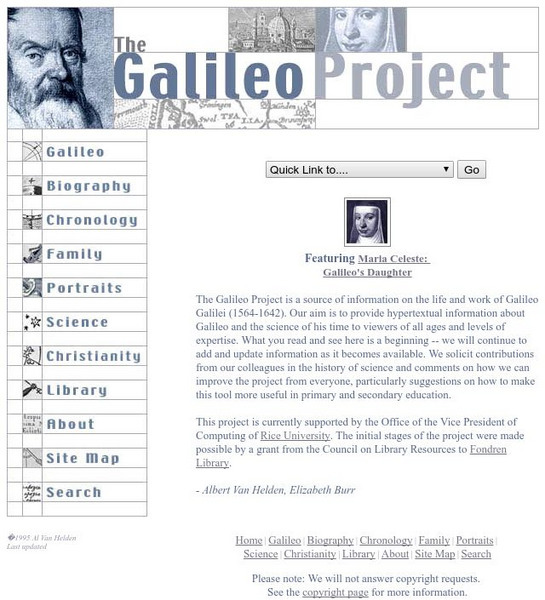Houghton Mifflin Harcourt
Harcourt: Biographies: Benjamin Banneker
A look at the life of a brilliant colonial American who was a mathematician, astronomer, inventor, surveyor and writer. (In Spanish)
PBS
Pbs Learning Media: Above the Clouds: Telescopes on Mauna Kea
This video segment adapted from First Light explains why the highest peak in the Pacific, Mauna Kea, is an ideal site for astronomical observations. Featured are new telescope technologies that allow astronomers to explore the universe...
PBS
Pbs Learning Media: Sagan on Time Travel
Astronomer Carl Sagan discusses the possibility of time travel in this audio-enhanced interview from the NOVAWeb site.
PBS
Pbs Learning Media: Birth of a Supernova, Type Ia
In this interactive activity from NOVA Online, learn about a type of exploding star - a Type Ia supernova - that is so bright that astronomers can measure the distance to the galaxy in which it resides, and even learn which elements make...
Science Buddies
Science Buddies: A Puzzling Parallax
Did you know that ancient astronomers could measure the distance to other stars? They could also distinguish between stars and planets. How could they do that without modern technology of telescopes? See if you can discover the link...
Science Buddies
Science Buddies: Catching Stardust
How do astronomers collect stardust? They design and build satellites that are launched into space to collect particles on specially designed panels. Satellites can be sent to orbit around an object of interest: a planet, moon, or comet....
Science Buddies
Science Buddies: Rainbow Fire
Astronomers can determine the atomic composition of distant stars by measuring the spectrum of light emitted by the star. Sound cool? Well in this project you can do something similar by observing the color of flames when various...
Other
China Daily: China Culture: Astronomy and Geography
Access a collection of articles about the scientific contributions made by the ancient Chinese in the areas of astronomy and geography. Includes write-ups of famous astronomers and geographers, astronomical instruments, and more.
NASA
Nasa: Astronomy Picture of the Day: A Milestone Quasar
An image of a typical quasar and a star. An explanation written by a professional astronomer is included. There are also many embedded links within the text to related topics.
NASA
Nasa: Imagine the Universe: Imagine the Universe!
This helpful site provides everything you want to know about studying the universe. Take a look at the tools and methods scientists use to study the universe, discover some of the objects that make up our universe, learn how scientists...
Vision Learning
Visionlearning: Mechanics: Gravity: Newtonian Relationships
Explanation of how astronomers and scientist developed the current theories of gravity.
PBS
Pbs Learning Media: Why Doesn't the Moon Fall Down?
In this animated video segment adapted from NASA, astronomer Doris Daou explains how the forces of speed and gravity keep the moon in a constant orbit around Earth. [1:36]
PBS
Pbs Learning Media: How Big Is the Universe?
In this media-rich essay from the NOVA Web site, astronomer Brent Tully of the University of Hawaii walks you through the latest scientific theories about the size of the universe.
Harvard University
Chandra Special Features
Chandra allows astronomers to view our galaxy and beyond in ways only dreamt of before. 14 interactive features are offered in this exciting look at cosmic phenomena.
The National Gallery (UK)
The National Gallery: Celestial Globe
As part of a larger exhibit on science and the history of scientific instruments, this site examines a detail from a painting by Olivier van Deuren which features a celestial globe. The globe is only one feature of the larger, more...
California Institute of Technology
Cool Cosmos: Ask an Astronomer
Explore the night sky with some help from Cool Cosmos. This site provides a list of the most frequently asked questions about the things we can see at night. Click on the question link and delve into the beauty of evening.
California Institute of Technology
Cal Tech: Cool Cosmos: Ask an Astronomer: How Many Moons Does Neptune Have?
Resource provides a brief answer to this question.
Robin Chew
Lucid Cafe: Polish Cleric and Astronomer
This site from the Lucid Cafe contains a short bibliography of Nicholas Copernicus. The information, though it is brief, is very factual and worth checking out with great links throughout for additional information on related subjects.
Stanford University
Stanford Univ/gravity Probe B/relativity Q&a
Click "Relativity Q & A". Over 200 questions and answers dealing with relativity (special and general), answered by NASA scientist Dr. Sten Odenwald. Answers are generally one paragraph, very clear and coherent.
Rice University
Galileo Project: The Galileo Project
Rice University offers an impressive online project about Galileo Galilei, his life and work. Includes a glossary of terms, a timeline, maps, pictures, primary texts, family letters, and sketches.
Sonoma State University
Sonoma State University: 1938 Bruce Medalist: Edwin Hubble
Site honoring the winners of the Catherine Wolf Bruce medal for lifetime contributions to astronomy. Edwin Hubble, the award winner in 1938, is highlighted in a biography.
Microscopy UK
Microscopy Uk: Robert Hooke: Father of Modern Science and an Unsung Hero
An excellent biography, including all major periods of Robert Hooke's life, works, inventions, career, and even his battle with Newton.
Other
The Astronomy Cafe: A Guide Book to Astronomy
Investigate the field of astronomy in this book by Sten Odenwald where he talks about his own and others' experiences, as well as his experiences doing research.
NASA
Nasa: Astronomy Picture of the Day: Edwin Hubble 1889 1953
Part of the NASA website, this is a reprint of an article in the Journal of the Royal Astronomical Society of Canada about Edwin Hubble's life and accomplishments, stressing his role in the development of modern astronomy.
Other popular searches
- Famous Astronomers
- Early Astronomers
- Major Astronomers
- Ancient Astronomers
- Greek Astronomers
- Report on Astronomers
- Astronomers Measure Distance
- Women Astronomers
- Female Astronomers
- Fumes Astronomers
- Five Early Astronomers
- Famous Astronomers Quizes


